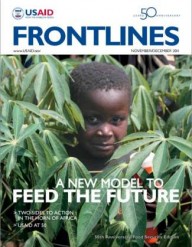50TH ANNIVERSARY
Fifty years ago, President John F. Kennedy called for the creation of an agency dedicated to saving lives, building partnerships, and promoting peace and prosperity in the developing world. He believed that advancing opportunity and freedom to all people was central to America’s own security, prosperity, and national conscience. Today, President Barack Obama and Secretary of State Hillary Rodham Clinton have echoed President Kennedy’s call with strong leadership and incredible commitment to development as a key pillar of our national security.
Since its creation, USAID has worked on the frontlines of poverty and conflict, supporting communities and countries to build a better future. In the past five decades, the Agency has graduated over 30 countries from assistance to partnership. From Brazil to Poland to Indonesia, developing nations have transformed into stable and prosperous countries, vibrant trading partners, and foreign assistance donors. These countries serve as beacons of hope for people striving for democratic political systems, free economies, and respect for their human rights. The critical work of USAID enables these peaceful transitions, helping to prevent and end conflict around the world today so we do not have to deploy our troops tomorrow.
Because global development is so important to our national interests, we have instituted a series of reforms to change the way we do business—with new partnerships, a greater emphasis on innovation, and a relentless focus on real results.
As we continue to shape a brighter future for generations to come, we must rededicate ourselves to continually improve the way we work and strengthen our capacity to deliver meaningful results for people around the world and at home.
FOOD SECURITY
Nowhere today is the challenge of hunger and food security more critical than in the Horn of Africa. As many of you know, the worst drought in 60 years has put more than 13.3 million people, especially women and girls, at severe risk. That is larger than the populations of New York City and Los Angeles combined.
In Somalia, where decades of civil war and disorder have contributed to the complete breakdown of governance, drought has led to famine. Within the next three months, 750,000 Somalis are likely to die if they don’t get additional assistance—assistance that is being blocked by Al-Shabaab and other groups in the region.
As the single largest humanitarian and development partner in the region, the United States is supporting life-saving aid for millions of people, including food, water, and medical services. And though the American people will always provide aid in times of urgent need, emergency assistance is not a lasting solution.
The reality is we must do more to prevent these crises in the first place. That is why President Barack Obama launched a global food security initiative called Feed the Future to help countries develop their own resilient agricultural sectors and food systems so they can feed themselves over the long term.
Through Feed the Future partnerships and investments, Kenya has seen a 300-percent increase in maize yields, while vitamin A-enriched sweet potatoes are now reaching malnourished children in Uganda and Mozambique. In regions vulnerable to drought—like the Ethiopian highlands—we are particularly focusing on drought-resistant crops and improved water management.
In August, I visited the Dadaab refugee camp in Kenya with Dr. Jill Biden and former Senator Bill Frist (R-Tenn.). I met families who had to leave behind their homes, their countries and—in some cases—faced the impossible choice of leaving behind their children, who were too weak to survive the trek. Families are facing this reality every day in the Horn—a reality made even more heartbreaking by the fact that it doesn’t have to be this way.
Through Feed the Future, we can help ensure countries sustainably develop their agricultural infrastructure and diversify their economies so they never succumb to another drought again. And we can help lift 18 million people, including more than 7 million children, out of hunger and poverty forever.










Comment
Make a general inquiry or suggest an improvement.